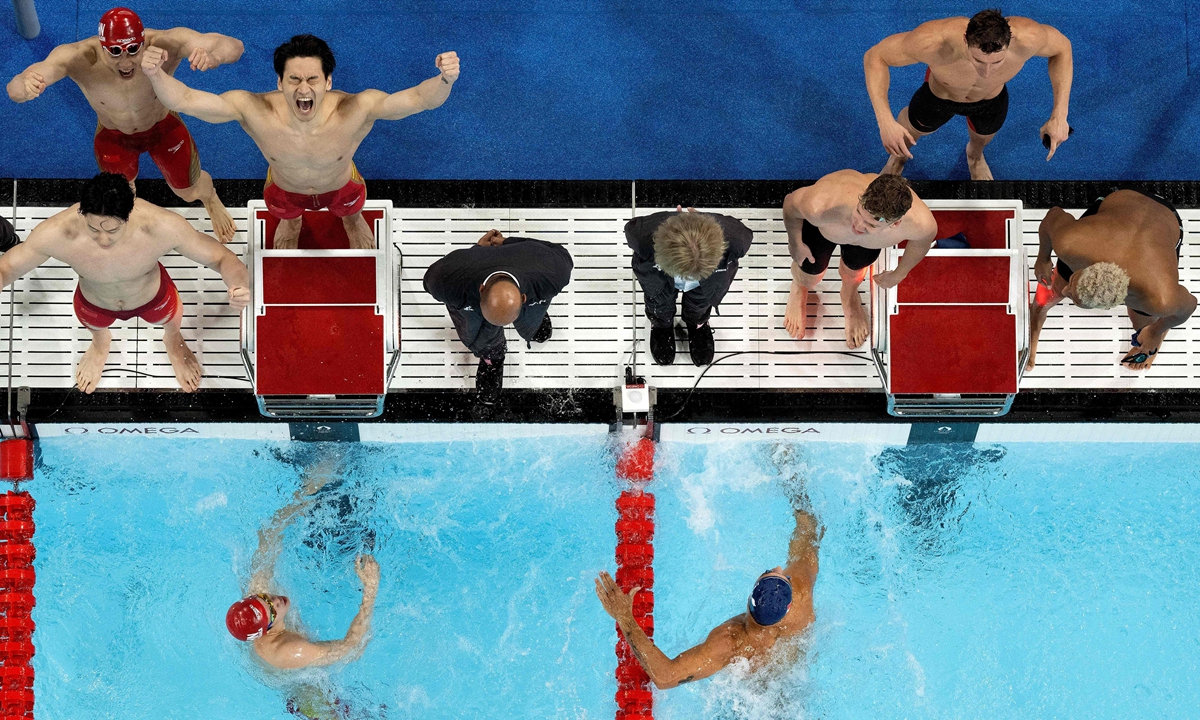![mk (From left) Chinese swimmers Xu Jiayu,<strong><a href=]() mk Qin Haiyang, Sun Jiajun and Pan Zhanle pose for a photo with their gold medals during the awards ceremony for the men's 4x100m medley relay at the Paris Olympics on August 4, 2024. Photo: VCG" src="https://www.globaltimes.cn/Portals/0/attachment/2024/2024-08-05/ed422889-bb22-41ed-96e0-03e184da7732.jpeg" />
mk Qin Haiyang, Sun Jiajun and Pan Zhanle pose for a photo with their gold medals during the awards ceremony for the men's 4x100m medley relay at the Paris Olympics on August 4, 2024. Photo: VCG" src="https://www.globaltimes.cn/Portals/0/attachment/2024/2024-08-05/ed422889-bb22-41ed-96e0-03e184da7732.jpeg" />(From left) Chinese swimmers Xu Jiayu, Qin Haiyang, Sun Jiajun and Pan Zhanle pose for a photo with their gold medals during the awards ceremony for the men's 4x100m medley relay at the Paris Olympics on August 4, 2024. Photo: VCG
The Chinese swimming team culminated their Paris Olympics campaign with a sensational gold medal in the men's 4x100m medley relay on Sunday, breaking 40 years of dominance by the US swimmers in this sport, as the team wrapped up the Paris Olympic Games with 12 medals and a new world record despite facing high-frequency drug tests.
Male backstroker Xu Jiayu, breaststroker Qin Haiyang, butterflyer Sun Jiajun and freestyle specialist Pan Zhanle clocked in 3 minutes 27.46 seconds to finish ahead of the US team in the medley relay.
The achievement upended the US' streak of winning gold in the event for 10 consecutive Olympics, a run that began at the 1984 Los Angeles Games.
Meanwhile, female butterfly specialist Zhang Yufei bagged the bronze medal in the women's 50m freestyle with a time of 24.20 seconds. Teamed up with Wan Letian, Tang Qianting, and Yang Junxuan, Zhang also secured another bronze in the women's 4x100m medley relay on Sunday.
The 26-year-old Zhang has pocketed a total of 10 medals at the Tokyo and Paris Olympics, making her the most decorated Chinese athlete with Olympic medals. Zhang finished with a medal in every discipline she participated in at the Paris Olympics, a rare achievement for Chinese swimmers.
The Chinese swimming team has won a total of 12 medals in Paris that consist of 2 golds, 3 silvers, and 7 bronzes. This surpasses their previous record of 10 medals at the 2012 London Olympics, making it one of the most successful performances in the team's history.
Among the four new world records set during the swimming events, 20-year-old Pan shattered his own record in the men's 100 meters freestyle with a time of 46.40 seconds, and, China also set a new Asian record in the mixed 4x100m medley relay.
Initially, Pan's achievement in the men's 100 meters faced a massive wave of skepticism, led by an Australian swimming coach who claimed it is "impossible" to win a 100m sprint by a body length, as he led an over 1-second margin to win gold in the iconic race.

Chinese swimmers (left) celebrate after winning the men's 4x100m medley relay at the Paris Olympics on August 4, 2024. Photo: VCG
But after Sunday's historical split time of 45.92 seconds in the men's 4x100m medley relay, though will not be recognized as a world record as it was in a relay, Pan's capabilities won a lot of respect.
"I fulfilled a promise I made a year ago and celebrated my birthday with a relay gold medal," Pan wrote on his Weibo. "A new journey has already begun, and I hope to contribute even more to the team."
Liu Yu, a Beijing-based sports commentator, told the Global Times on Monday that China's achievements were made more remarkable given the frequent drug tests and the unwarranted suspicions raised by foreign media.
"Although the Chinese swimming team won fewer gold medals in Paris compared to the three golds at Tokyo Games, the two gold medals they did win (in the men's 100m freestyle and men's 4x100m medley relay) came from events traditionally dominated by athletes from Europe, the US, and Australia," Liu told the Global Times. "This breakthrough is highly significant and has a profound impact on the global swimming scene."
The swimming team won a total of 12 medals at the Paris Games, the highest number of medals they have ever achieved in their Olympic history.
This accomplishment highlights the team's strength and balanced development across various events, firmly establishing China as a powerhouse in the swimming pool, he noted.
"Notably, despite the unfriendly environment created by some Western media that sought to discredit the Chinese swimming team, the athletes defied the doubts and overcame the challenges from frequent anti-doping tests, which also proves their excellence," Liu said.
World Aquatics has confirmed that Chinese swimmers were the most tested athletes leading up to the Paris Olympics, with each of the 31 Chinese swimmers being tested an average of 21 times since January.
This is significantly higher than their American counterparts, who have been tested an average of six times, and Australian swimmers, who have been tested an average of only four times.
On Friday, Pau Gasol, a member of the International Olympic Committee (IOC) Athletes' Commission and a two-time NBA champion, voiced regret over the frequent doping tests imposed on Chinese swimmers, though he emphasized the importance of respecting the World Anti-Doping Agency (WADA).
"There was absolutely nothing found [in the tests], and I am not sure whether the measure (of testing Chinese swimmers twice or three times more than others) was right or not. Multiple tests in the early hours of the day and at night were not easy on the athletes, especially because the constant testing disrupted their rest, training, and other plans," Gasol said.

